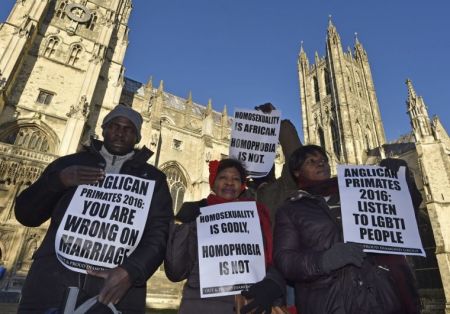Scottish Episcopal Church Approves Gay Marriage; Opponents 'Broken by Move That Harms Unity'

The Scottish Episcopal Church voted on Thursday to redefine marriage to include same-sex couples, becoming the first major U.K. church to break from the Anglican majority, which defines marriage as a union between one man and one woman.
The change to canon law on marriage was agreed by the required two-thirds majority in each section of the synod — the bishops, clergy and laity. Sixty-seven percent of clergy and 80 percent of bishops and laity voted in favor of gay marriage.
The new clause removes the language stating that marriage is a "physical, spiritual and mystical union of one man and one woman."
It recognizes that there are different understandings of marriage within the church and allows clergy to solemnize marriage between same-sex couples. Clergy who do not agree with gay marriage will not be obligated to go against their conscience.
"This is the end of a long journey," said the Most Rev. David Chillingworth, Bishop of St. Andrews, Dunkeld and Dunblane and Primus of the Scottish Episcopal Church. "We have studied, thought and prayed.
"This is a momentous step. By removing gender from our marriage canon, our church now affirms that a same sex couple are not just married but are married in the sight of God."
The Scottish Episcopal Church, which has over 350 churches across Scotland, is a member of the Anglican Communion — a global church body that defines marriage as between a man and a woman and rejects homosexual practice as incompatible with Scripture.
Responding to the controversial vote, the Church of England said that it will continue opposing gay marriage, noting that the majority of the Anglican Communion stands by its side, despite growing disagreement on the issue.
"The Church of England is unable by law to marry couples of the same sex and the teaching of the Church of England remains unchanged. However, this is a matter on which there is real and profound disagreement in the Church of England," a spokesperson said.
Ian Ferguson, of Aberdeen and Orkney, the only Scottish diocese to oppose the change to redefine marriage, lamented the vote, saying, "This is one of the saddest and most painful days for us ... We are broken. This schismatic move ... will cause serious harm to our unity."
He added that some congregants "may seek alternative episcopal oversight."
The Telegraph pointed out that the conservative Anglican group Global Anglican Future Conference had said before the vote: "If this action is taken it will further marginalize faithful Anglicans in Scotland who seek to uphold Jesus's teaching on marriage."
Chillingworth acknowledged that the decision is "difficult and hurtful" for those who believe redefining marriage is unbiblical and wrong. "For them this new chapter will feel like an exclusion — as if their church has moved away from them.
"So the journey which we now begin must also be a journey of reconciliation."
He said the Scottish church body will move forward with "two honorable and historic understandings of marriage —– one which sees the marriage of same sex couples as an expression of Christ-like acceptance and welcome — and another which says that the traditional view of marriage is God-ordained and scripturally defined."
Supporters of the change in marriage law praised the outcome of the vote, BBC News noted, with the Episcopal Church's Bishop of Edinburgh, the Right Reverend Dr. John Armes, stating: "I am very pleased for the couples who can now have their relationships recognized by the church and blessed by God."
"I'm also pleased for what this means about our church and the way we have been able to do this. But obviously any change like this creates pain and hurt in some as well, so as a bishop of the church I feel for them."
Other major members of the Anglican Communion, such as the U.S. Episcopal Church, have also voted to support gay marriage. The U.S. church was temporarily suspended from the Communion for its stance last year, but it has refused to go back on its decision despite the controversy.
Archbishop Josiah Idowu-Fearon, secretary general of the Anglican Communion, said that the Scottish church has made "a departure from the faith and teaching upheld by the overwhelming majority of Anglican provinces on the doctrine of marriage."
He pointed out that that the churches within the Communion are "autonomous and free to make their own decisions on canon law," however, and said the Scottish Church's change to canon law will be discussed at the next meetings of the primates of the Communion in Canterbury in October.





















